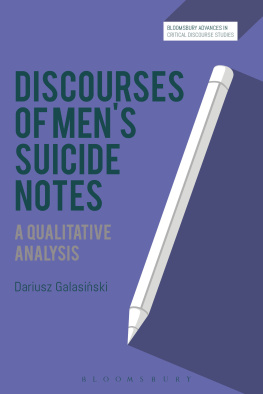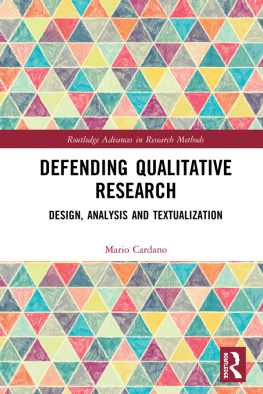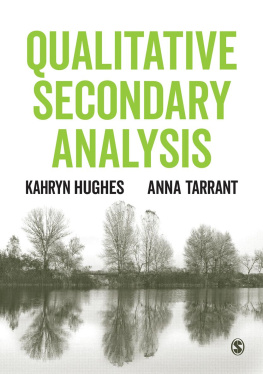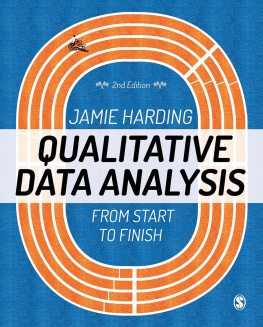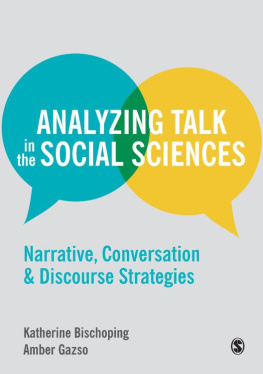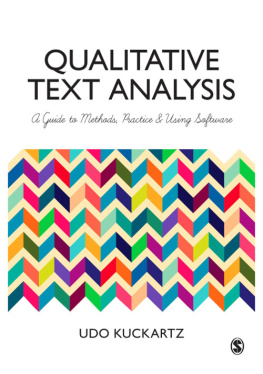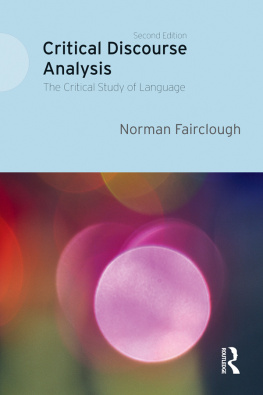Dariusz Galasianski - The Discourse of Mens Suicide Notes: A Qualitative Analysis
Here you can read online Dariusz Galasianski - The Discourse of Mens Suicide Notes: A Qualitative Analysis full text of the book (entire story) in english for free. Download pdf and epub, get meaning, cover and reviews about this ebook. year: 2017, publisher: Bloomsbury Academic, genre: Religion. Description of the work, (preface) as well as reviews are available. Best literature library LitArk.com created for fans of good reading and offers a wide selection of genres:
Romance novel
Science fiction
Adventure
Detective
Science
History
Home and family
Prose
Art
Politics
Computer
Non-fiction
Religion
Business
Children
Humor
Choose a favorite category and find really read worthwhile books. Enjoy immersion in the world of imagination, feel the emotions of the characters or learn something new for yourself, make an fascinating discovery.
- Book:The Discourse of Mens Suicide Notes: A Qualitative Analysis
- Author:
- Publisher:Bloomsbury Academic
- Genre:
- Year:2017
- Rating:3 / 5
- Favourites:Add to favourites
- Your mark:
- 60
- 1
- 2
- 3
- 4
- 5
The Discourse of Mens Suicide Notes: A Qualitative Analysis: summary, description and annotation
We offer to read an annotation, description, summary or preface (depends on what the author of the book "The Discourse of Mens Suicide Notes: A Qualitative Analysis" wrote himself). If you haven't found the necessary information about the book — write in the comments, we will try to find it.
The Discourse of Mens Suicide Notes: A Qualitative Analysis — read online for free the complete book (whole text) full work
Below is the text of the book, divided by pages. System saving the place of the last page read, allows you to conveniently read the book "The Discourse of Mens Suicide Notes: A Qualitative Analysis" online for free, without having to search again every time where you left off. Put a bookmark, and you can go to the page where you finished reading at any time.
Font size:
Interval:
Bookmark:

To my life
Series Editors: Micha Krzyanowski, David Machin and John Richardson
Bloomsbury Advances in Critical Discourse Studies is a series that looks at exciting, cutting edge work in critical discourse studies, in terms of its multidisciplinarity of method, theory, and topic of analysis. The series explores how critical discourse studies engages with the social, political and ideological landscape of the modern world, and how these contexts are reflected, (re)-produced and mediated through language and other modes of communication.
Titles published in the series:
Critical Discourse Studies and Technology, Ian Roderick
The Politics and Rhetoric of Commemoration, Michael Billig and Cristina Marinho

I would like to thank the editors of the Bloomsbury Advances in Critical Discourse Studies series for taking on this volume. I am also indebted to Micha Krzyanowski for his insightful comments on a late draft. I would also like to acknowledge the help of Monika Zako-Zieliska and Maciej Piasecki in giving me access to the Polish Corpus of Suicide Notes.
I will never be able to thank Justyna Zikowska enough for our long conversations on suicide notes and her comments on the first draft; they enriched this book. I thank Ania Galasiska for our long conversation about the book in Exmouth. It opened new possibilities.
And, as ever, to Ania and Micha, thank you for being close.
This is not a book about suicide, it is about suicide notes. It is about how suicide and those who take their own lives are discursively constructed in their suicide notes. It is through exploring those constructions that insight is offered into the social anchoring and meanings of suicide from the point of view of those who do it. In contrast to the very rare research via interviews into the experiences of those who survived a suicide attempt, suicide notes offer unsolicited data through which to view suicide. But saying that this book is not about suicide is not simply a piece of information that I would like the readers to have. No, this statement places this book (and the research underpinning it) outside of the dominant tradition of research into suicide notes.
This book is founded on a contradiction between suicide and masculinity. Suicide is one of the most stigmatizing acts and, although there is evidence that todays stigma is more subtle (Feigelman et al., 2009), people who have killed themselves are still considered more blameworthy, weak, cowardly, selfish and sinful than those who died, for example, from cancer (Sand et al., 2013). On the other hand, the dominant model of masculinity (see e.g. Connell, 1995) is anything but what people who kill themselves are considered to be. And so, in essence, the contradiction is about how a strong master of the universe, as Faludi (2000) puts it, can perform such a cowardly act. Also, most particularly, what do they say in their final act of communication? Put differently, my book aims to redress a significant gap in the literature on suicide notes and private constructions of suicide. With its focus on men and masculinity, it answers the acute need for a more thorough understanding of suicide behaviour in the group which is at greatest risk of suicide. In this Introduction, I aim to place it within the tradition of studying suicide notes, masculinity and discourse.
Hitherto, research into suicide notes has focused on them as gateways to understanding the suicidal mind, the people who attempt or do kill themselves, or indeed the suicidal behaviour itself. In contrast, I focus on such notes as situated social texts. That is to say, I am interested in farewell letters as products of discursive practices drawn upon by those who write them; as well as in suicide notes as having certain discursive and linguistic forms in addition to their content. To my knowledge, such a study has never been attempted.
Therefore, offering an insight into suicide notes as social texts is my overall aim. As I explore the discourses in which men anchor their farewell letters, I will investigate their three aspects:
How men construct the act itself, the relationships they have, the life before and after their death, as well accounts of the reasons for their suicide. I am also concerned with the framing of a timeline that is constructed by the writing of the note and suicide. To what extent, for example, is suicide the final act in the life of the person completing it?
I want to explore the subject positions that are discursively constructed by and for the men who wrote their suicide notes. Do they write them as men, maybe as fathers, or perhaps as husbands/partners? As they construct their masculine identities, I also explore their relationship with suicide. For, as masculinity and fatherhood are associated with power, suicide is the opposite it is weak and stigmatizing. To what extent then does it undermine a man who is about to take his life?
I am interested in the discursive construction of the note itself and the process of its writing; sometimes days, but sometimes only minutes, before its authors death. What does the note mean, what is its significance, what power (or lack of it) is it invested with?
In sum, I shall be exploring discourses from and about men who were probably at the most dramatic juncture of their lives. Men who have culturally been positioned to be masters of the universe (Faludi, 2000) and yet, they decided to kill themselves. I want to do it in a way that has not been done before: by analysing suicide notes as social texts, focusing predominantly, though not exclusively, on their linguistic and discursive form, through which they construct the reality in which their authors position themselves.
This book is something that happened to me. I had only just started interviewing men who had attempted to kill themselves when I learned of the Polish Corpus of Suicide Notes (Polski korpus listw poegnalnych samobjcw; http://www.pcsn.uni.wroc.pl/). I started reading the notes and practically dropped all other things, and very quickly decided to write about them. The notes I read are the most difficult data I have ever worked with. Not only did I know that the author of every single note I was reading was dead, having killed himself, I also was encountering their final messages letters written on the precipice. The reading was very difficult, and it took me almost 3 months just to go through them; mostly, because I simply could not read them for an extended period of time. It was like having access to the raw misery and pain of those who were about to take their lives.
Now, I realize that I am not merely writing about suffering, but I am also writing about men, which is political. Inevitably, it raises issues of power, patriarchy or gender relations. Ever since I started writing about men who are weak, vulnerable and disenfranchized, and giving them voice, I understand that I have been treading on somewhat thin ice. This is why I want to make my political projects in the book explicit. They are similar to those I made clear in my earlier works on men and masculinity (Galasiski, 2008, 2013).
To begin with, I want to restate my commitment to, and the importance of, research into men and masculinity, even those who are white, heterosexual and middle-aged (like me). There are plenty of issues relating to men, also those men that used to be taken as the human universal, that are not only interesting but also important both to us and to society. Our suicides are certainly one of them.
Next pageFont size:
Interval:
Bookmark:
Similar books «The Discourse of Mens Suicide Notes: A Qualitative Analysis»
Look at similar books to The Discourse of Mens Suicide Notes: A Qualitative Analysis. We have selected literature similar in name and meaning in the hope of providing readers with more options to find new, interesting, not yet read works.
Discussion, reviews of the book The Discourse of Mens Suicide Notes: A Qualitative Analysis and just readers' own opinions. Leave your comments, write what you think about the work, its meaning or the main characters. Specify what exactly you liked and what you didn't like, and why you think so.

